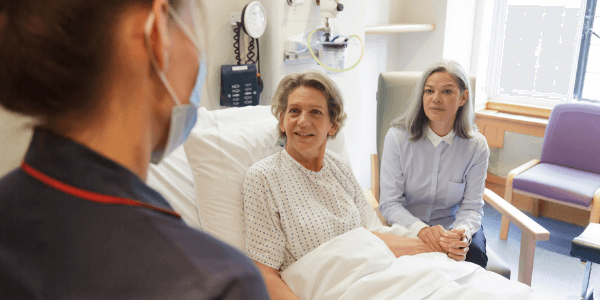Common questions about womb cancer

Womb cancer, also referred to as uterine or endometrial cancer, is a type of gynaecological cancer that can affect anyone with a womb, including women and some trans men. You cannot develop cancer of the womb if you’ve had a hysterectomy – a surgical procedure to remove the womb.
If you’ve recently been diagnosed with womb cancer or you think you may have symptoms, you will have many questions about your diagnosis and treatment.
Your medical team will be on hand throughout your personal journey to support you with everything you need, every step of the way.
In this article, we’re going to answer some of the most common questions about this type of cancer, including if our genes and our weight might have an effect on our risk of developing womb cancer.
What is womb cancer?
Womb cancer is a type of gynaecological cancer that affects the cells of the womb. The medical term for womb is uterus, and for this reason, it’s also referred to as uterine cancer.
Most cases of womb cancer start in the cells of the lining of the womb, called the endometrium. Therefore, this is called endometrial cancer.
Womb cancer is the most common gynaecological cancer in the UK, and can affect anyone with a womb, at any age. However, it tends to be most common in postmenopausal women. If caught early enough, treatment is highly successful.

What are the common symptoms of womb cancer?
The most common symptom of womb cancer is abnormal or unusual vaginal bleeding. Unusual vaginal bleeding can be described as:
- Bleeding after the menopause
- Unusually heavy periods in women that haven’t yet reached menopause
- Spotting or bleeding between periods
- A change in your usual vaginal discharge
- Blood stained discharge
Other symptoms of womb cancer include:
- Blood stained urine
- Painful sex
- Pain in your lower abdomen or back
- A swelling or a lump in your abdomen
These symptoms can be caused by something other than cancer, but if you notice any of the above, or anything else you’re concerned about, speak to your GP.
What causes womb cancer?
One of the main causes of womb cancer is thought to be having a high level of oestrogen in your body. High oestrogen can be caused by a number of factors, including:
- Taking certain types of hormone replacement therapy (HRT)
- Having polycystic ovary syndrome (PCOS)
- Having never given birth
- Experiencing your menopause after the age of 55
- Being overweight or obese
There are other factors that may increase your risk of developing breast cancer and these include:
- Having a family history of womb cancer
- Having a family history of ovarian or bowel cancer
- Having taken tamoxifen to treat breast cancer
- Having had radiotherapy treatment on your pelvic area
- Having diabetes
Does being overweight cause womb cancer?
Recent research suggests that being overweight or obese may put you at a higher risk of developing womb cancer.
This is because carrying a higher level of fat under the skin (called adipose tissue) increases levels of the hormone estrogen which in turn thickens the lining of the womb, called the endometrium. This can then lead to an increased risk of endometrial cancer.
So whilst womb cancer isn’t necessarily caused by carrying excess weight, there does appear to be a direct link between being overweight or obese and having an increased risk of developing womb cancer.

Is womb cancer hereditary?
Some cancers are hereditary, meaning that you may carry a gene, passed down from one or both of your parents, that means that you’re more likely to develop a certain type of genetically-linked cancer, than someone without the gene. For example, some types of breast cancers are linked to an inherited gene.
Most cases of womb cancer are not hereditary, although some are. There is also a relatively rare disease called Lynch syndrome that is passed on in our genes.
Having a faulty Lynch-related gene can make us more likely to develop womb cancer (as well as bowel cancer). Someone with Lynch syndrome may develop womb cancer as a younger person, before their menopause.
Many families will not know if they carry this faulty gene, but if someone develops womb cancer before their menopause and isn’t overweight, doctors may suggest genetic testing.
If the prevalence of Lynch syndrome is discovered, all family members will be invited to attend regular screening for gynaecological and bowel cancers.
Womb cancer linked to Lynch syndrome presents with the same symptoms of womb cancer unrelated to this faulty gene. It’s treated in the same way, and has the same good prognosis if caught early enough.
If you have womb cancer, or you’re worried that you might, watch our informative Gynaecological Cancer Explained webinar to learn how our multidisciplinary team can help provide you with an individualised care plan to support your diagnosis and recovery.
More information
- If you’re concerned about gynaecological symptoms of cancer, speak to your GP who may refer you to a specialist. (Don’t have a GP?)
- The King Edward VII Hospital’s Gynaecological Oncology department is equipped with the latest technology, services and staff to diagnose, treat and manage all types of gynaecological cancers, including womb cancer.









